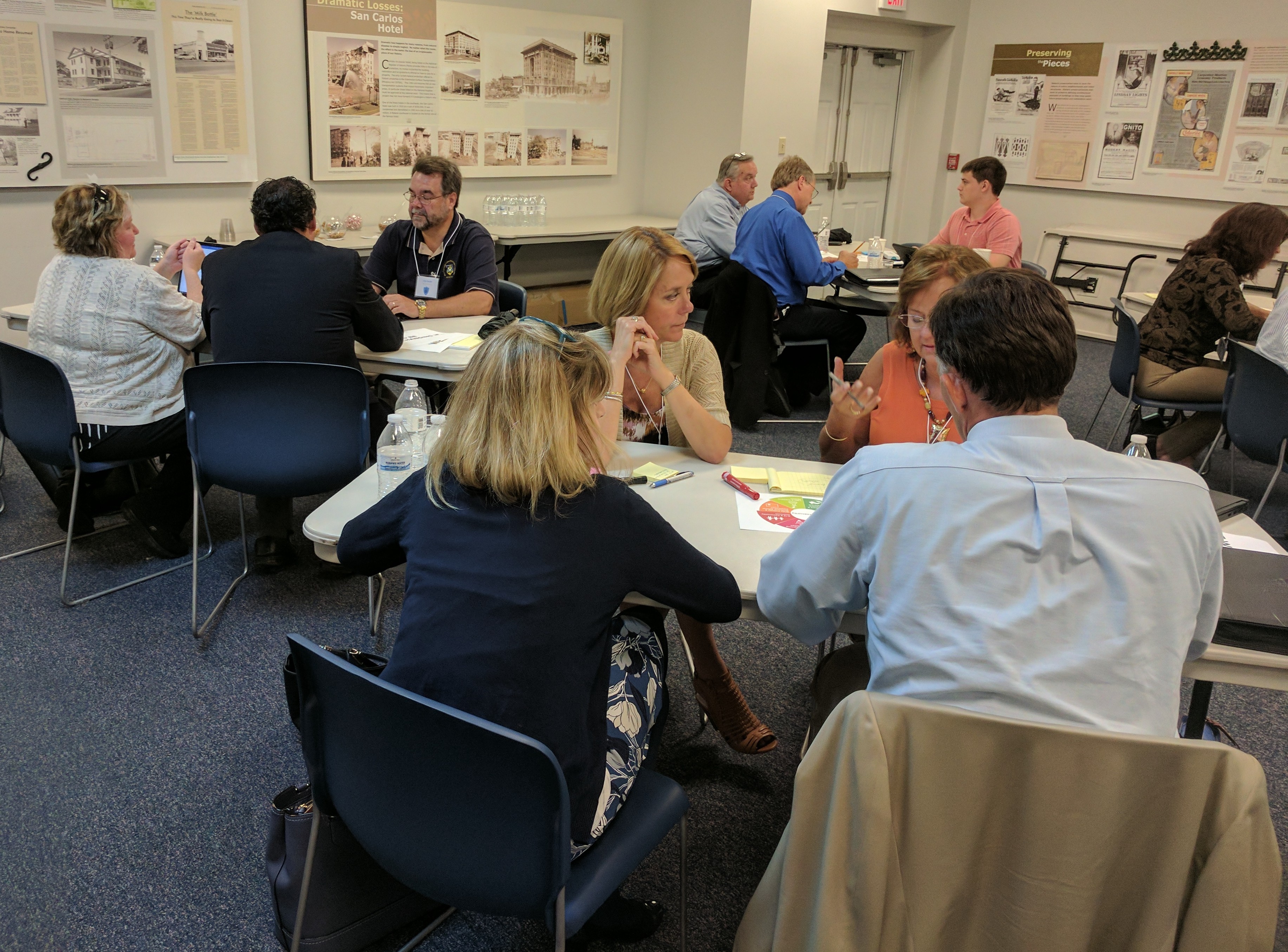UWF Center for Cybersecurity to play prominent role in Innovation Network
August 17, 2017 | cybersecurity@uwf.edu

Innovators across Northwest Florida convened in downtown Pensacola on Tuesday for the University of West Florida Innovation Network meeting. The University envisions students living and learning on site while participating side-by-side with educational and business partners, conducting real-world research and being immersed in engaged learning through the planned UWF Innovation Network.
Pam Northrup, vice president of the Division of Research and Strategic Innovation, opened the meeting by saying, “We want labs in creative spaces. We want to think the coolest space ever and that’s what we want to build.
“We’re thinking very big. We’re envisioning students with spaces in Pensacola, Fort Walton, Panama City and everything in between as their laboratories.”
Participants broke into groups to discuss cybersecurity, advanced manufacturing, and Gulf and coastal communities.
The cybersecurity group zeroed in on potential impact of a cybersecurity innovation network in Northwest Florida for students, community and industry. Dr. Eman El-Sheikh, director of the UWF Center for Cybersecurity, Adm. Gerry Hoewing, UWF senior advisor for strategic initiatives, Innovation Institute, and Dr. Brice Harris, assistant vice president, Division of Research and Strategic Innovation, guided the activities.
Cybersecurity professionals and students divided into five groups to brainstorm on how to increase interest in cybersecurity among students and deal with common challenges in the industry. Common challenges included workforce, education and training, branding and economic development. Points of interest for students included career pipelines, integrated learning and recognition of skills.
Harry Huelsbeck, Northrop Grumman manager of cyber information assurance, spoke for his group and cited higher standard of living, increased tax base, better infrastructure and increased influence on tourism as potential benefits from an innovation network. His group recommended establishing a program for industry professionals to mentor students. Huelsbeck said such a program stands to benefit both parties.
“Students are going to tell us how we need to change our thinking in the industry,” Huelsbeck said.
Mike Hicks Jr., Hixardt Technologies president/CEO, said there is a shortage of cleared, capable and certified cybersecurity professionals in the market. The state of Florida employs 37,184 cybersecurity professionals, but that still leaves 13,212 openings, according to cyberseek.org.
Hicks’ group suggested UWF collaborate with industry for an internship in which students spend the first two years gaining professional experience before being assigned to a project in which they obtain facility clearance upon completion.
“You’re going to be able to pull industry into that,” Hicks said. “What industry wouldn’t want to be part of that process?”
Tom Skinner, Northrop Grumman cyber solutions division deputy program, spoke for his group which recommended extending cybersecurity education to elementary students in an effort to increase the number of future cybersecurity professionals.
“Can you peak their interest at a time when it really makes a difference?” Skinner said.
Participants discussed the importance of Increasing diversity in the cybersecurity industry. National statistics indicate women comprise only 11 percent of cybersecurity employees and African-Americans, Hispanics and Asians account for less than 12 percent of the workforce.
Dr. Michelle Taylor, Workforce Education director for the Escambia County School District, urged cybersecurity experts to infiltrate areas where a high percentage of minorities live and educate the students.
Escambia County Commissioner Doug Underhill said cybersecurity is a profession that should be immune to discrimination, and he is at a loss for why that is not the case.
“Can you code? That’s what matters. Cybersecurity should truly be a post-racial society; however, it’s doing the exact opposite,” Underhill said. “There’s a growing divide between who’s in it and who’s not.”
One group ranked improving diversity at the top of priority list for a successful innovation network. A skilled workforce, clearances, federal investment and publicity joined diversity on the lists.
The participants agreed that turning Northwest Florida into a cyber coast starts with education and training. The UWF Center for Cybersecurity is positioned to spearhead that effort. The National Security Agency and Department of Homeland Security designated UWF as a National Center of Academic Excellence in Cyber Defense Education and as the CAE Regional Resource Center for the Southeast Region of the U.S. In this role, the UWF Center for Cybersecurity provides leadership to advance cyber defense education among colleges and universities in Alabama, Florida, Georgia, Puerto Rico, South Carolina and Tennessee.
“The UWF Innovation Network will feature innovative experiences and spaces that bring UWF students and faculty together with industry experts to solve real world problems and support the community,” El-Sheikh said. “It paves the way for economic growth, workforce development and building Florida's Cyber Coast.”







